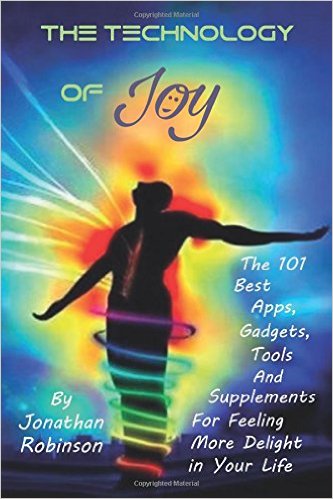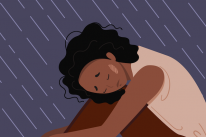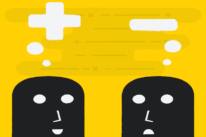
Update – The winners for this giveaway are:
- D. Arturo Gutierrez
- Preston Cox
- Kathleen Han
If you’re anything like me, you may think that technology can be both a blessing and a curse.
Sometimes I lament that we now live in a world where tiny screens often hinder real-world engagement, and social media can create pressure to entertain an audience our peers by sensationalizing our everyday lives.
But then I remember that technology is just a tool, and its affects depend on how we use it. Sure, technology can create distance and exacerbate the struggle to be authentic, but it can also do the opposite if we use our gadgets to create deeper, more meaningful connections.
In much the same way, technology can increase feelings of isolation and depression, or it can contribute to our overall well-being. It all depends on our intention and our choices.
Since I am always interested in discovering new tools to increase my joy and foster inner peace, I was excited to learn about psychotherapist Jonathan Robinson’s new book The Technology of Joy: The 101 Best Apps, Gadgets, Tools and Supplements for Feeling More Delight in Your Life.
His book covers a variety of methods to boost your joy, including:
- Gadgets that can enhance pleasure, deepen relationships, and help you feel gratitude
- Specific apps that have been shown to make people happier and create more loving relationships
- Supplements that can induce euphoria, elation, and feelings of connection and peacefulness
You’ll learn what these tools can do for you, and how and where to get these happiness hacks. In addition, you’ll discover how to know which of these tools are most likely to be the best ones for you.
I’m grateful that Jonathan took the time to answer some questions about his work and his book, and that he’s provided three free copies for Tiny Buddha readers.
 THE GIVEAWAY
THE GIVEAWAY
To enter to win one of three free copies of The Technology of Joy:
- Leave a comment below
- For an extra entry, tweet: Enter the @tinybuddha giveaway to win a free copy of The Technology of Joy http://bit.ly/1qYeSk8
You can enter until midnight PST on Monday, April 25th.
THE INTERVIEW
1. Tell us a little about yourself and what inspired you to write this book.
I’ve been a psychotherapist for thirty years, as well as someone who has been interested in such things as meditation, hypnosis, and the use of various drugs. Since I like to feel joy and ecstasy, I’ve always been on the lookout for any simple technique or tool that can safely help me to feel fantastic.
Over time, I have collected a lot of gadgets, tools, and supplements that can do that. In fact, my friends often come to my house to “get high”—without needing to ingest drugs—by making use of my various tools.
They eventually wanted to know where to get all these things, so in my book I laid out the best of what I’ve learned and used over the years.
2. A lot of your work focuses on finding peace and happiness. Why do you think so many of us struggle with depression these days?
We used to spend more time with nature, or with a caring family or spiritual community. Yet nowadays those things are hard to find. We live in a stressful culture, and yet we are not taught how to let go of the ongoing stress we are subject to.
Now more than ever it’s important for people to find happiness and peace within themselves. To do this takes practice and the right equipment—just like learning to cook or play tennis. Most people have not invested in learning good practices or finding the right equipment (technologies) for overcoming depression and/or being happy.
3. You’re a proponent of treating depression without antidepressants. I find that people often get quite upset by the suggestion that they can heal without medication. Why do you think this is such a hot button issue, and do you believe anyone can treat depression through alternative means?
Studies at Harvard show that antidepressants are no better than placebos for 93% of the people taking them. For the other 7%, I believe (and research shows) that antidepressants can be very helpful.
The reason I think this is a hot button issue is that people want to blame their depression on a “brain imbalance,” and thereby abdicate that there is anything they can do to help alleviate it. Yet, the research shows that there are many things people can do that are more helpful than taking antidepressants for overcoming depression.
If people want more information about that, I have a whole website dedicated to it at: www.FromSad2Glad.com
4. How did you come across the 101 methods you shared in your book?
I have long had a fascination with methods that are quick, easy, and powerful. For thirty years it has been a “hobby” of mine to research and try out anything that I thought might help myself or others feel more joy and peace.
Most things out there don’t work very well, but every now and then I would come across a supplement, app, or gadget that really worked extremely well. Such tools have made my life a lot richer, more peaceful, and joyous.
5. Which of the methods have you found most personally helpful, and why?
I’ve noticed that different things work for different people, but personally I have really enjoyed certain cognitive enhancing supplements such as Sulbutiamine and CDP Choline—especially when taken together.
I also love something called “the Tingler,” a neuro-stimulator called “the Thync,” and about a dozen high tech audio soundscapes that I name in the book that help induce feelings of peace, joy, and even ecstasy. If you try enough things out, you soon find things that fit what you really want, and are convenient enough that you really use them.
6. What did you learn from your interview with the Dalai Lama about these technologies?
The Dalai Lama was extremely interested in these technologies. In fact, he said, “If it was possible to become free of negative emotions by a riskless implementation of an electrode without impairing intelligence and the critical mind—I would be the first patient.”
He has long supported research into the brain in order to help facilitate what could be called the “engineering of enlightenment.” I believe that someday soon, we will all be able to more easily reach higher states of consciousness with the aid of various technologies. They have certainly helped me.
7. You mentioned a bunch of joy-boosting apps. Which were your favorites, and why?
There are a lot of them out there. I list over thirty of them in my book. Yet the ones I find myself using the most are ones called Happier, Buddhify, Headspace, and Gratitude Journal.
Many of these have simple and quick guided meditations that make me feel really good, or have ways to help me tap into feelings of gratitude. I also like one called Couple that helps to deepen one’s primary relationship.
8. You talk about a magical mantra that leads to gratitude. Can you share what that mantra is?
Many years ago, I went to India to visit a guru who supposedly had a “magical mantra” for feeling gratitude. When I finally got a chance to talk to this guru, he said, “Whenever possible, repeat the following words: the mantra I give you are the words ‘thank you.’”
Hearing that, I was very disappointed. I looked at him and said, “That’s it?” He responded, “No, ‘that’s it’ is the mantra you have been using, and that mantra makes you feel like you never have enough. My mantra is ‘thank you,’ not ‘that’s it.’ ‘That’s it’ will take you nowhere!”
Well, to make a long story short, although I was disappointed with this so-called “magical mantra,” since I had journeyed so far to get it, I started to use it.
Many times a day I’d say “thank you”—from my heart—for life’s many blessings. I’d say “thank you” to God or the Universe for a hot shower, a good meal, a hug from my wife, a greeting from my dog—whatever. Soon, I noticed I was feeling a lot more gratitude in my life. His “mantra” really worked!
9. What do you think the future of “hacking happiness” will look like?
Slowly but surely scientists will figure out even better ways to help us let go of stress, negative emotions, and suffering. In addition, new tools and supplements will be developed that help people to tap into the “kingdom of heaven within.”
Fortunately, that “future” is already here—but most people don’t know about the great tools and supplements that already exist. In the future, these tools and supplements will become more popular, more convenient, and even less expensive.
10. What is the most important thing you want people to take from your book?
I want people to get that in order to feel more joy, love, or gratitude in life, there are many tools, gadgets, and supplements that can really help. By investing a little time and money in learning what works for you, your life can become a lot richer and more enjoyable.
You can learn more about The Technology of Joy on Amazon here.
FTC Disclosure: I receive complimentary books for reviews and interviews on tinybuddha.com, but I am not compensated for writing or obligated to write anything specific. I am an Amazon affiliate, meaning I earn a percentage of all books purchased through the links I provide on this site.
Woman with cell phone image via Shutterstock
About Lori Deschene
Lori Deschene is the founder of Tiny Buddha. She started the site after struggling with depression, bulimia, c-PTSD, and toxic shame so she could recycle her former pain into something useful and inspire others to do the same. You can find her books, including Tiny Buddha’s Gratitude Journal and Tiny Buddha’s Worry Journal, here and learn more about her eCourse, Recreate Your Life Story, if you’re ready to transform your life and become the person you want to be.
- Web |
- More Posts












 Though I run this site, it is not mine. It's ours. It's not about me. It's about us. Your stories and your wisdom are just as meaningful as mine.
Though I run this site, it is not mine. It's ours. It's not about me. It's about us. Your stories and your wisdom are just as meaningful as mine.
I want a copy of the book!!!
Sounds like an interesting read, I’d love the chance to give it a try!
Our phones and tablets provide us so much potential, and using the right tools can improve our lives. Looking forward to reading this book!
I would love to learn what this book has to say!
Sounds like an interesting read, looking forward to it!
Looking forward to incorporating your magical mantra “Thank you” more into my every day life. I say it often, but I know I need to feel it in my heart more and use it more on the “little joys” of life. So, Thank you for this post 🙂 – Blessings!
Perfect timing for this moment in my life, when I’m looking for joy! Would love this book.
Thank you for sharing about this book. It sounds fantastic!
I keep telling myself that I have to get rid of the technology and get back into nature to find Joy, but I have such a supportive group of people in my life that I only connect with online… I’m interested in learning how to find a better balance. 🙂
That magical mantra: wow. I got a little choked up on that one. I was expecting something detailed and intricate, but the best solution is sometimes the simplest. Thank you!
It is an interesting concept how technology can help us live more meaningful living. I cannot wait to read it.
Technology helps me to enjoy music even more. I love, for example, to be listening to my favorite radio station from Paris in real time (FIP Radio France) while driving around Phoenix, Arizona.
Excited to take a look at this!
Technology can help us with the burdens and repetitive things in the world we live, so that we can enjoy The World we Live.
It can also be made and used to enhance our senses for a deeper experience…
I would love to win!!
What a great resource! Thank you!
I’d love to get this book 🙂
Am always looking for tools to make life better
Looks like a wonderful book, very interesting and insightful! I would love the opportunity to read it! 🙂
As a psychotherapist I am also interested in quick and easy ways to attain peace… and I am developing a gadget myself!
I have struggled with how to harness the power of our smartphones to be a tool for improvement rather than a tyrannical master.
Joy! I need that during this transition time of my life.
This is such an interesting topic to read about! I have found that when I am working (on site where technology is not allowed), I am at my happiest and most joyful.
Sounds so great! Although I know there’s no “cure” or easy fix, I’m always looking for things to help in the process of adding joy and more gratitude to my life.
This definitely sounds like a great read. If I don’t end up winning, I’ll be buying the book anyway! 🙂
Thank you for sharing. I would love to read this! <3
Count me in.
Technology can shape our minds, but when aware of that, we can turn the tables and use technology to influence our world. For example look at the work of @tinybuddha 😀
I use a variety of apps for productivity, why not for “hacking happiness” as well? I look forward to reading!
Would love to know some happiness hacks to share with the people I care too!
Hooray! Another awesome giveaway. Bring it on!
Cant wait for my copy! I’ll have my daughter read it as well!
I can’t wait, I’m currently detoxing myself from anti-depressants. I told my Dr enough is enough and he agreed.
Amazing read. Thank you!
My life has been an ongoing struggle to feel happiness and joy as my family tree has many branches of depression, anxiety and unfortunately untimely life endings when the suffering became too great for some. I have tried to feel better by trying to anaesthetise my pain with alcohol and food which landed me in a month long residential rehab program at the end of 2011. I have shelves full of self-help books hoping to ‘retrain my brain’ and thought programming. Still here I am at 47 struggling on searching for an answer. Tiny Budda is becoming part of that answer and this book appears to be a fantastic resource of tools to help those who find life a bit ‘harder’ than others. Thank you for presenting these tools and sharing the wisdom / experiences of authors like Jonathan Robinson with our now global community.
It would be nice to feel pure joy again…it’s been some time. Blessings.
I’ve recently made it a mission to find apps and gadgets to help in my pursuit of happiness, mindfulness and productivity. I’m thrilled to know there is a book geared towards this. Thank you!
I have *never* thought of technology as something that leads to joy! I love the prospect of possibly making it work for me, though! <3
I’m always looking for ways to have more joy in life. Thanks for this interview and the chance to win.
Thank you for the chance to win.
Thank you!
About time 🙂
Some much “stuff” out there now a days. So much of it being used in destructive and harmful ways. This seems like an interesting read. 🙂
Great concept!
The use of technology in enhancing the quality of your life purely depends upon how and when you use it. Being a web developer, technology/apps/gadgets are something I breathe and are rather my companions in happiness. Side by side, Living with nature, showing gratitude for day-to-day blessings coming your way and try to live in the present can keep you grounded and aligned with the mother nature.
whats in the book ? :D:D:D gimme…i ll tell you 😉
😀 love.peace
Wow. Wouldn’t that be cool to get that? Enhance my Joy, enhance my wealth
I could use a little joy in my life. I have a lot coming at me & I’m really struggling.
Meaningful information between technology and human.
creating space for joy to enter my world is my work at the moment. Any help I can get is needed.